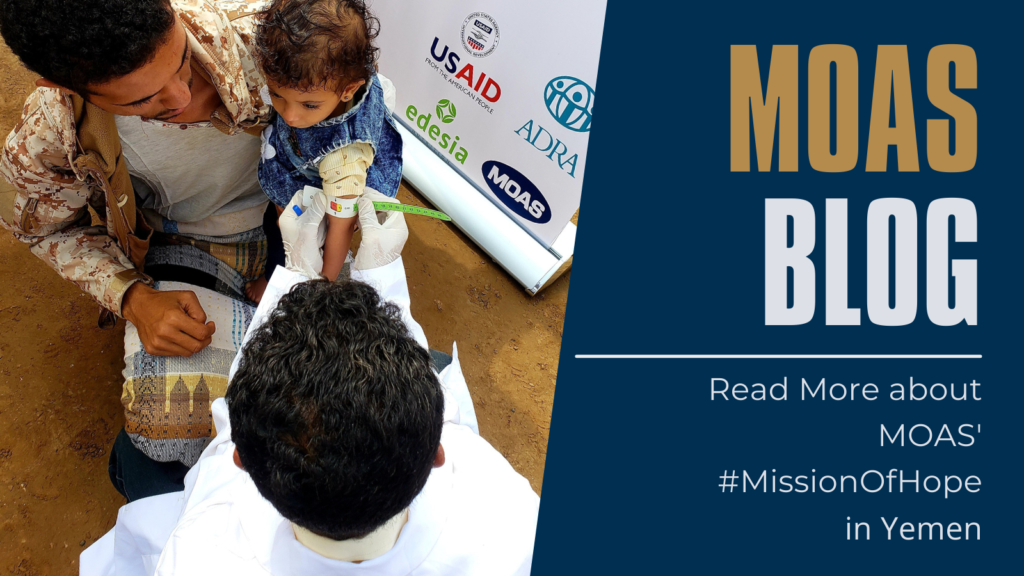On the World Humanitarian Day, which is celebrated every year on 19th August, this week’s blog is focusing on MOAS’ #MissionOfHope in Yemen, where – in the past 7 years – the war has caused one of the world’s most dire humanitarian catastrophes. Millions of Yemeni people are starving and have little in the way of medical care.
Food crisis in Yemen – context
According to Yemen HNO (Humanitarian Needs Overview) 2021, food insecurity and malnutrition are the main drivers behind the number of people in need in Yemen. Over 16.2 million people will go hungry this year (Integrated Food Security Phase Classification (IPC) Phase 3 or higher), Including 5 million people facing emergency conditions and nearly 50,000 who were already experiencing catastrophe conditions. Up to 2.25 million cases of children aged 0 to 5 years old and more than a million pregnant and lactating women are projected to suffer from acute malnutrition in 2021. Additionally, over 15.4 million people require support to access their basic water and sanitation needs, of whom 8.7 million are already in acute need. In 2021 the situation is expected to deteriorate further, and the severity of needs is expected to increase unless there is significant conflict de-escalation and an improvement in the economy and funding. Those are not only numbers, but children, mothers, families, facing a terrible crisis, shortage of food and in need of humanitarian assistance to survive.
The challenges posed by the ongoing conflict have been exacerbated by COVID-19, mainly through economic and humanitarian challenges that have had a tremendous impact on internally displaced people (IDPs) in Yemen.
MOAS IN YEMEN
Since 2018, MOAS has been working hard to provide aid to Yemeni communities living amidst the unrest of a country torn apart by civil war. In 2020, we managed to ship 50 tons of food supplements thanks to our partners Edesia. All our aid deliveries were coordinated and distributed by our in-country partner, ADRA Yemen. They consisted in 1710 cartons of Plumpy’Nut®, which have been distributed in 9 districts spread in 3 governorates of Yemen (Abyan, Lahj, and Al-Dhale’e).
In 2021 we have already shipped 75 tons of nutritional aid and a container of supportive pharmaceuticals, which are expected to arrive in the port of Aden in the coming months – we will keep you updated, as always. Mohammed Bahashwan, ADRA’s Director of USG Programs and Partnerships in Yemen, in our podcast about the partnership with MOAS stated:
“I’ll say this with complete honesty and no exaggeration, the support from MOAS throughout the past years has been paramount to the programming we do, especially for addressing malnutrition needs. Most of our programming is lifesaving focused, and in most of the large number of health facilities ADRA covers through our programming, sustained access to malnutrition materials and nutrition supplements is a big challenge. The food items provided by MOAS have had a much-improved outcome. Food materials are normally provided without addressing the core gaps in the family, as children are usually ignored or overlooked as a result of this larger scale crisis. And again it’s because of the support of MOAS, ADRA was able to ensure a sustained source of therapy food. The supply chain in Yemen is very weak and challenged by the security situation so having this access and support from MOAS for our interventions is a great driver of much more impactful programming.”
What is Plumpy’Nut®?
Peanut-based Plumpy’Nut® is based on the formulation of F-100 milk and complies with the World Health Organization’s definition of RUTF. It is a Ready-to-Use Therapeutic Food (RUTF), provided by manufactures Edesia, who partner with MOAS on this life-saving initiative. The product is specifically prepared for the treatment of Severe Acute Malnutrition (SAM) in children 6 months of age and older. The treatment, which has an average duration of 6-10 weeks, is based on a simple fortified peanut butter recipe, and is a powerful tool to save children’s lives. Invented by a French pediatrician, Plumpy’Nut® can last without refrigeration for up to two years and is very easy to use, since it doesn’t need water to be consumed. Medical staff can provide parents with a two-week supply that can easily be administered to the children at home, with no need for hospitalization. Because peanut allergies are nearly nonexistent in the developing world, there’s little risk of a deadly allergic reaction.
After receiving the 92-gram, 500-kilocalorie supplement, the children begin rapidly gaining weight and come back to life. That is what happened to many of the 4275 children identified by ADRA and enrolled in the outpatient therapeutic program to combat malnutrition, such as Bayan, 17 months, Ishaq, 9 months, or Rahma, 15 months, who are recovering and are gaining weight thanks to Plumpy’Nut®.
Final thoughts
MOAS will continue to work and collaborate with our partners to provide life-saving nutritional supplies and aid to the most vulnerable communities in need of humanitarian assistance. To save lives and avert a further worsening of the situation, MOAS needs your support to keep on with the nutrition deliveries for children suffering from severe acute malnutrition.
If you are interested in the work of MOAS and our partners, please follow us on social media, sign up to our newsletter and share our content. You can also reach out to us any time via [email protected]. If you want to support our operations, please give what you can at www.moas.eu/donate.



